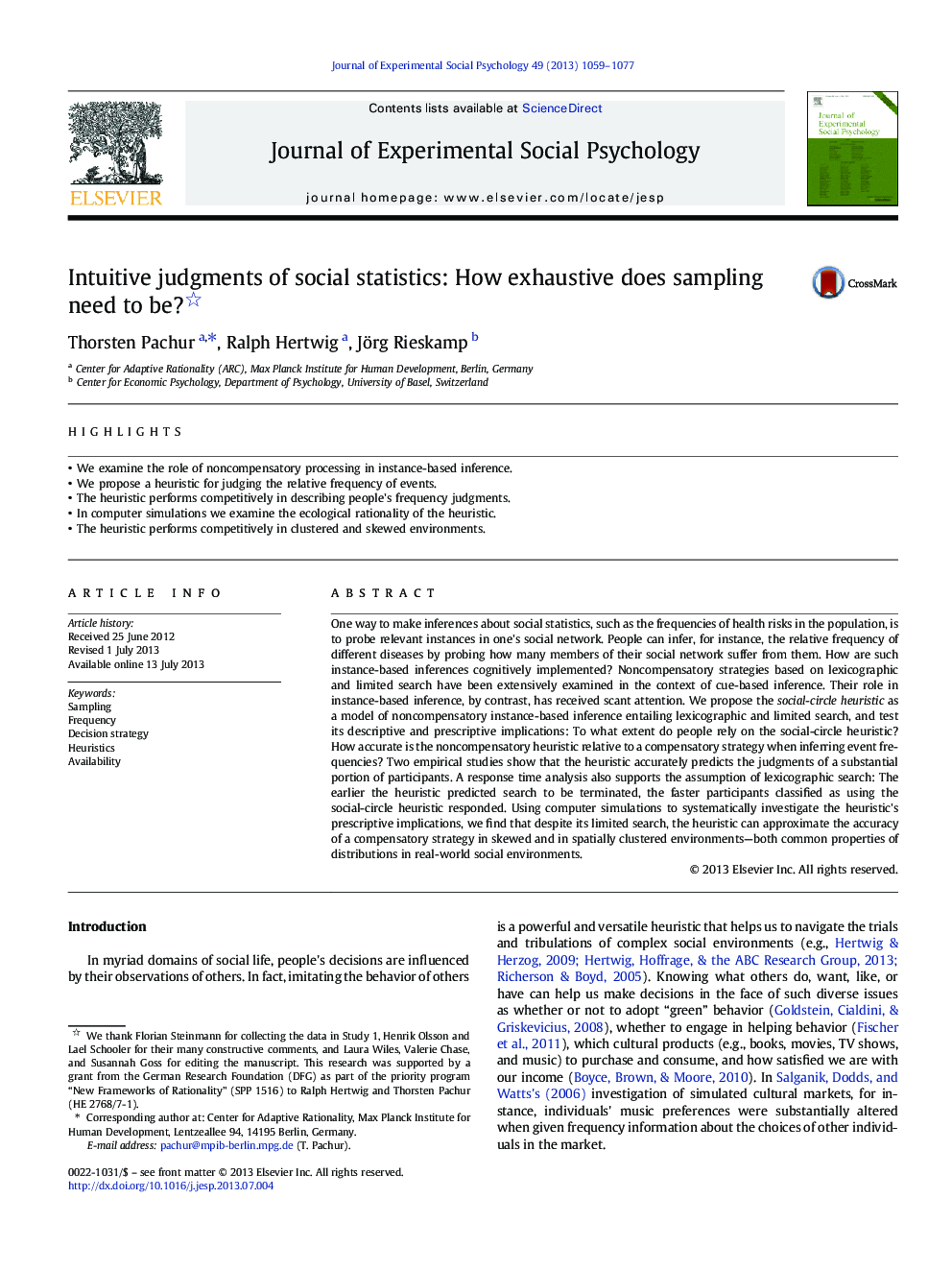| کد مقاله | کد نشریه | سال انتشار | مقاله انگلیسی | نسخه تمام متن |
|---|---|---|---|---|
| 10468546 | 926447 | 2013 | 19 صفحه PDF | دانلود رایگان |
عنوان انگلیسی مقاله ISI
Intuitive judgments of social statistics: How exhaustive does sampling need to be?
ترجمه فارسی عنوان
قضاوت های شهودی از آمار اجتماعی: چگونه باید نمونه گیری کامل باشد؟
دانلود مقاله + سفارش ترجمه
دانلود مقاله ISI انگلیسی
رایگان برای ایرانیان
کلمات کلیدی
نمونه برداری، فرکانس، استراتژی تصمیم گیری، اهریمنی، دسترسی،
ترجمه چکیده
یکی از راه های به دست آوردن نتیجه گیری در مورد آمار اجتماعی، مانند فرکانس خطرات بهداشتی در جمعیت، بررسی پرونده های مربوطه در شبکه اجتماعی است. به عنوان مثال، افراد می توانند فراوانی نسبی بیماری های مختلف را با در نظر گرفتن اینکه تعداد اعضای شبکه اجتماعی آنها از آنها رنج می برند، تعیین کند. چگونه چنین نتیجه گیری های مبتنی بر نمونه به طور شناختی انجام می شود؟ استراتژی های غیرقطعی مبتنی بر جستجوی لغوی و محدود شده به طور گسترده در زمینه استنتاج مبتنی بر نشانه شناخته شده است. در مقابل، نقش آنها در استنتاج مبتنی بر نمونه، توجه کمتری به دست آورده است. ما اکتشافی اجتماعی-دایره ای را به عنوان یک مدل از استنتاج مبتنی بر نمونه های غیر انتزاعی ارائه می دهیم که شامل جستجوی لغوی و محدود است و پیامدهای توصیفی و تجربی آن را تست می کنیم: تا چه حد افراد به اصول اخلاقی اجتماعی متکی هستند؟ چقدر دقیق، اکتشافی غیرواقعی نسبت به یک استراتژی جبرانی در هنگام فراخوانی وقایع رخ می دهد؟ دو مطالعه تجربی نشان می دهد که اکتشافی دقیق قضاوت های بخش قابل توجهی از شرکت کنندگان را پیش بینی می کند. تجزیه و تحلیل زمان پاسخ نیز از پذیرش جستجوی لغوی پشتیبانی می کند: پیش از آن که پیش بینی جستجوی جستجوی اکتشافی به پایان برسد، شرکت کنندگان سریع تر به این نتیجه رسیدند که استفاده از اکتشافی اجتماعی دایره ای پاسخ داد. با استفاده از شبیه سازی های کامپیوتری برای بررسی سیستماتیک پیامدهای پیشگیرانه اکتشافی، ما می بینیم که علیرغم جستجو محدود آن، اکتشافی می تواند دقت یک استراتژی جبرانی را در محدوده های محاطی و در محیط فضایی خوشه ای - هر دو خواص مشترک توزیع ها در محیط های اجتماعی دنیای واقعی را تقریبی کند.
موضوعات مرتبط
علوم زیستی و بیوفناوری
علم عصب شناسی
علوم اعصاب رفتاری
چکیده انگلیسی
One way to make inferences about social statistics, such as the frequencies of health risks in the population, is to probe relevant instances in one's social network. People can infer, for instance, the relative frequency of different diseases by probing how many members of their social network suffer from them. How are such instance-based inferences cognitively implemented? Noncompensatory strategies based on lexicographic and limited search have been extensively examined in the context of cue-based inference. Their role in instance-based inference, by contrast, has received scant attention. We propose the social-circle heuristic as a model of noncompensatory instance-based inference entailing lexicographic and limited search, and test its descriptive and prescriptive implications: To what extent do people rely on the social-circle heuristic? How accurate is the noncompensatory heuristic relative to a compensatory strategy when inferring event frequencies? Two empirical studies show that the heuristic accurately predicts the judgments of a substantial portion of participants. A response time analysis also supports the assumption of lexicographic search: The earlier the heuristic predicted search to be terminated, the faster participants classified as using the social-circle heuristic responded. Using computer simulations to systematically investigate the heuristic's prescriptive implications, we find that despite its limited search, the heuristic can approximate the accuracy of a compensatory strategy in skewed and in spatially clustered environments-both common properties of distributions in real-world social environments.
ناشر
Database: Elsevier - ScienceDirect (ساینس دایرکت)
Journal: Journal of Experimental Social Psychology - Volume 49, Issue 6, November 2013, Pages 1059-1077
Journal: Journal of Experimental Social Psychology - Volume 49, Issue 6, November 2013, Pages 1059-1077
نویسندگان
Thorsten Pachur, Ralph Hertwig, Jörg Rieskamp,
